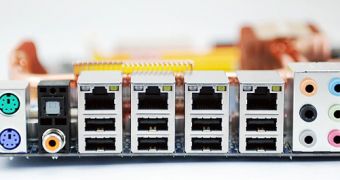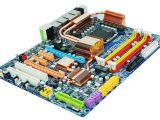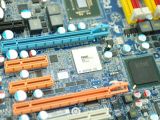While the vast majority of the mid-range / high-end motherboard manufacturers ship their offerings with dual-Gigabit Ethernet connections, Gigabyte ups the LAN ante with a four-LAN connector model. Most computer users usually connect to the Internet via a single network cable, but if you need more gear for a LAN party, you should check out Gigabyte's high-end DQ6 model.
The motherboard is based on Intel's P45 chipset and has reached the final stage of design. Although four LAN RJ-45 jacks may seem a little extreme, the board is especially designed for home server applications that need extra bandwidth from additional network connections. More than that, a computer equipped with such a board could easily act as a high-end network node, with additional firewall and routing software aboard.
This is not the first attempt at squeezing as much bandwidth as possible from a wired network. Nvidia introduced a similar feature in its previous chipsets, when it introduced two Gigabit Ethernet connectors for a virtual 2 GB data transfer rate.
The higher-end P45-DQ6 also comes with full support for Intel's 45-nanometer processors running at FSB speeds of 1600 MHz. Unfortunately, memory support is limited to the already obsolete DDR2-1200 modules. Other worth-mentioning features are the Gigabyte patented Dynamic Energy Saver technology as well as two PCI-Express 2.0 x16 slots.
Since it's a high-end offering, Gigabyte rigged the motherboard with a full-copper cooling system, AMD's CrossFire support and a decent 7.1 channel integrated audio solution. The motherboard comes with SATA-II connectivity (10 ports), able to deliver peak transfer rates of up to 3 Gbps.
Although the P45-DQ6 is completely functional, with sample units shipping for a long time now, there is no official release date yet. This is mostly due to the fact that Intel did not release the chipset as of the moment of writing, probably because it wants to properly introduce its last unit to support the LGA775 socket.

 14 DAY TRIAL //
14 DAY TRIAL // 

